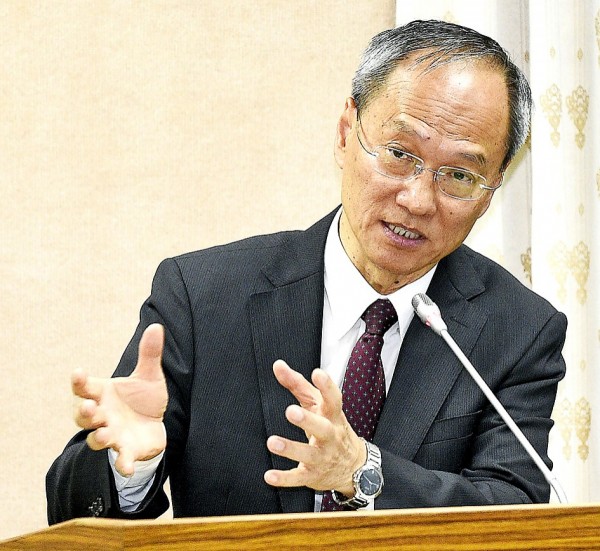《TAIPEI TIMES》 China mobilizing unification advocates

Overseas Community Affairs Council head Wu Hsin-hsing speaks during a question-and-answer session at a meeting of the legislature’s Foreign and National Defense Committee in Taipei yesterday. Photo: Chen Chih-chu, Taipei Times
CHINESE COMPATRIOTS: Many Chinese living overseas yearn for democracy and learn that the China they know is different looking from the outside in, a minister said
By Lu Yi-hsuan and Chen Wei-han / Staff reporters with CNA
Beijing has been mobilizing overseas political parties who advocate unification across the Taiwan Strait to visit Taiwanese political parties under the guise of economic exchanges, while “discouraging independence and promoting unification,” Overseas Community Affairs Council (OCAC) Minister Wu Hsin-hsing (吳新興) said yesterday.
Wu made the statement during a question-and-answer session at a meeting of the legislature’s Foreign and National Defense Committee.
China has been very active in Asian overseas communities, working through multiple organizations, such as the China Council for the Promotion of Peaceful National Reunification, to quash suggestions of Taiwanese independence, Wu said.
Propaganda that seeks to divide and undermine overseas compatriot groups friendly toward Taiwan has been distributed at various events, Wu said.
The efforts were aimed at downsizing the scale of Taiwanese overseas compatriot organizations, as well as undermining support for the Republic of China (ROC) and unity over Taiwanese identity, Wu said.
Just as Beijing has sought to undermine solidarity of Taiwanese overseas compatriot groups, so to have Taiwanese groups toward Chinese compatriots, Wu said.
Taiwan has been countering continued Chinese “United Front” tactics and there is a growing number of overseas Chinese attending Taiwanese events and proudly waving the Taiwanese flag, he said.
“The number of overseas Chinese is growing and they are finding that the China they knew while living in it is not necessarily the same China other nations see,” Wu said.
Many Chinese compatriots yearn for Taiwan’s democracy and are often seen attending national events, he said.
Cross-strait relations is a competition between democracy and communism, Wu said, adding: “The people will choose for themselves” which system is better.
The OCAC has great faith in overseas Taiwanese compatriots and believes that their support for the nation is unwavering and strong, Wu said.
Meanwhile, legislators expressed concern that members of the China Council may be meeting with “United Front” sympathizers inside Taiwan.
Democratic Progressive Party (DPP) Legislator Liu Shih-fang (劉世芳) asked Wu if the OCAC was aware of which political parties the council met with when they visited.
Members of the council met with members of the Chinese Nationalist Party (KMT), the New Party, the Alliance for the Reunification of China, the China Unification Promotion Party (中華統一促進黨) and other pro-unification political groups, Wu said, adding that the OCAC had expressed its disavowal for local political parties to receive members of the council, but they continue do so.
No OCAC members on the China council and no OCAC officials, including those holding honorary titles, attended China’s National Day celebrations this year, Wu said.
The greatest concern the China Council’s visit poses is whether it is seeking to disrupt Taiwan’s democracy through non-democratic means, New Power Party Legislator Hsu Yung-ming (徐永明) said.
“While unification is a political view that people are free to express in Taiwan, it is a concern that Taiwan’s democracy might be compromised by non-democratic means, such as violence and offshore funding,” Hsu said.
He called on the government to look into the financing of the council, which could reveal the purposes of the organization.
“It is difficult to regulate overseas organizations with Taiwanese laws and what we could do is to alert the public to these organizations’ hidden agenda,” Hsu said.
However, laws can be amended to deal with domestic organizations allegedly networking for Beijing, such as the China Unification Promotion Party, Hsu said.
While Taiwan is a democracy where people are free to express their political beliefs, measures have to be taken against Beijing seeking to influence the nation’s democracy, Democratic Progressive Party Legislator Huang Wei-cher (黃偉哲) said.
National security could be compromised if Beijing is actively approaching and inciting Taiwanese, Huang said.
Chinese councilors should be banned from entering Taiwan if the purpose of their visit is different from what is stated on their visa application, the lawmaker said.
The National Immigration Agency should reject their entry and deport them if necessary, he added.
新聞來源:TAIPEI TIMES

















